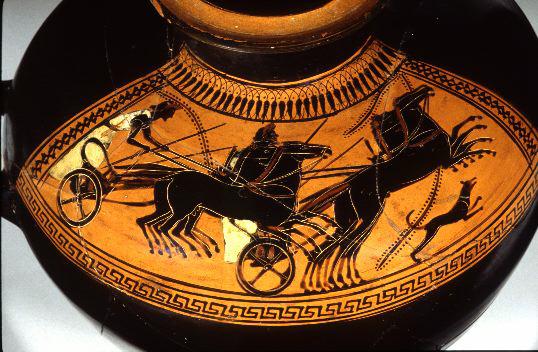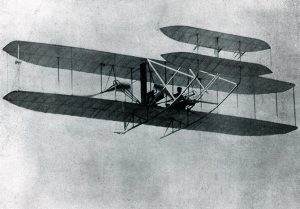The Olympic Games weren’t always as majestic as they are today. In our modern times, every four years the eager anticipation of once again witnessing the talent of nationally recognized athletes competing overshadows any other occurring events; that’s exactly how it was in ancient Greece. However, the purpose for the games has shifted over time. The first Olympic games made its mark in history in 776 B.C.E. Competition within ancient Greece was intended to demonstrate power and wealth to the Greek world. The human body was treasured for its physical capacity. As a result, competitive games often tested the endurance of the body. Festivals honoring the Greek gods were also a popular setting for hosting competitions. Although they were not yet named Olympic games, these competitions attracted crowds interested in moments of exhilaration in their otherwise ordinary lives. At that time, the games were a uniting hallmark of Greek culture and religion, a recognition of athleticism, as well as an indicator of Greek wealth and prowess that contributed to Greek self-identity.1

Religious festivals were celebrations honoring the Greeks’ gods and goddesses. The Greeks praised the gods; a way of doing so was by partaking in the funeral games, such as the one that Homer tells us about in his epic poem Iliad, where the hero Achilles holds such games in honor of his dead friend Patroclus.2 Today we attend funerals that are full of sorrow and sympathy, but the services the Greeks would host were filled with enjoyment and competition. They saw this as a way to honor and worship the gods, by acting in competitive games. Many of the athletic events eventually evolved into the Olympics. Chariot races of dashing horses, wrestling and boxing matches that were barbarous, foot races, discus throwing, archery, and spear throwing were the activities everyone put their time into at this festival.3
The Greeks believed that Zeus would favor some athletes and deny victory to others, so the athletes who were not denied saw this as empowering. The Greeks loved to be seen as worthy by the gods, so when Zeus would favor certain athletes, those competitors became evermore interested in the outcome of the games. The Nemean Games honoring Zeus was a huge festival the Greeks attended. One of the myths describing the origins of these games claims that they began as funeral games for prince Opheltes, who died as a baby in Nemea. During this festival, athletic and equestrian events were held. The Greek gods contributed to the start of the games. They were divinities that the people looked up to in a literal sense, since their home was thought to be at the top of Mount Olympus, “home of the gods and goddesses.” However, who was allowed into the games? Well, it turns out that if one weren’t Greek or if one spoke a different language, one was forbidden from entering or participating. Only free men were initially allowed to participate in games. Women were prohibited from engaging in or watching the games because the games tended to get severely brutal, and such brutality would scar the eyes of the women.4

In Homer’s portrayal of the funeral games for Patroclus, the hero Diomedes was the first to win the chariot race. He was rewarded with a slave woman and a cauldron. Prizes in the Olympics weren’t always like the ones Diomedes received, but they were ones that would make a Greek famous and rich.5 The winning athletes were presented with a wreath of olive leaves. Also, the city-state or polis for which they were representing gave the competitor a monetary award.6 But for equestrian events, the rider was never given the prize; it was given to the owner of the horse. The games in the Olympics were not quite the same ones we have today. The games in ancient Greece evolved into more challenging events. For example, the chariot races then had competitors racing while wearing armor; today, we no longer have this game. A popular competitive event today is volleyball, but it did not exist in the ancient Greek events. This is an example as to the changes that have been made over time.
Preparation for their exercises during training was a big deal to the instructors and to the athletes. The Anointer played a role in their training. He was the one who would smear oil on the athletes’ bodies in a certain circular technique; he kept the athletes’ bodies relaxed by doing this. Greeks would have to train for at least ten months before they would partake in their specific duels.7 One of the famous wrestlers, Milo, is an example as to how the athletes would train. Milo carried a calf over his shoulder every day, so the heavier the calf, the faster and stronger his body became. His training led him to win thirty-two wrestling competitions; to show that he was capable of doing this he had carried an ox on his shoulders through the Olympia stadium.8
One of the most important outcomes from the start of the Greek Olympic games was that every time they hosted them, all conflicts were put on hold between all Greek poleis or city-states. The competitions were a chance for the Greeks from different poleis to intermingle. The leaders from the different poleis went to support their athletes, but also to negotiate political disputes with the other leaders. This was called the Olympic truce, meaning that there was an agreement on making sure that there would be no warfare occurring during the games. This truce was made to maintain the focus on the games. The Greek religion was mainly about worshiping the mythological gods and goddesses, so the Olympics became a practice for the people in honoring their gods. Those who participated in the games were held at a high standard because they were representing their polis. In ancient Greece, the games gave the city-states the opportunity to come together and work out their conflicts face-to-face without warfare. In the modern era, we too strive for the same thing, for the Olympics to be a bridge between peoples and a place where political differences are set aside. But there have been many situations in the past that causes it to be troubling in this era.
- Salem Press Encyclopedia, January 2016, s.v. “Religion and Mythology in Ancient Greece,” by Judy Johnson. ↵
- Homer, Iliad (Boston: Houghton Mifflin & Company, 1881), 240-252. ↵
- Salem Press Encyclopedia, January 2015, s.v. “Olympic Games in the Ancient World,” by Thomas J. Sienkewicz. ↵
- Salem Press Encyclopedia, September 2016, s.v. “Sports and Entertainment in the Ancient World,” by Patrick Adcock. ↵
- Homer, Iliad (Boston: Houghton Mifflin & Company, 1881), 240-252. ↵
- Barbara Maussier, “The New Ethical Dimension of Sports Events: a Reflection on the Evolution from the Ancient Greek Olympic Sports Festival to Postmodern Sports Events,”Cultura, Ciencia y Deporte 12, no. 34 (January 2017): 21. ↵
- Salem Press Encyclopedia, September 2016, s.v. “Sports and Entertainment in the Ancient World,” by Patrick Adcock. ↵
- Encyclopaedia Britannica, June 2017, s.v. “Milo of Croton.” ↵



73 comments
Belene Cuellar
Wow it’s interesting to see the how the Olympics have changed over time. I have always been a big fan of the Olympics because it’s so fun to see the many athletes that come out and compete to their best ability. It is a bit disappointing that women were denied this luxury back in Greece, but at least now women can watch and compete in the games. I never knew about the variety of prizes that were given out back in ancient Greece. This article was really informative and detailed in the history of the Olympics.
Josselyn Arrieta-Meraz
It is very fascinating to read about the origin of the Olympian games, what they stand for. The Greeks were very competitive and they were always looking for a way to test to get the best of the best, and were rewarded with a title, with fame and riches, one of their main purposes. While reading this I would connect back to what the Olympic games stand for now in days, we look up to these Olympians because they too practiced really hard to be where they are at, so while in many ways the games have changed in others they have not.
Osman Rodriguez
I love the Olympics. This is a great article explaining the history of what is now the Olympic Games. I know that they originated from the Greeks and that they were different from the games we know today. Still, I didn’t know their significance and as to why they started. Many of the things you said that the Olympics do, in regards to society, still applies today. They help bring people together and we acknowledge others. We also get to marvel at the amazing athletes around the world.
Zeresh Haman
It is really fascinating to read about the origins of the Olympics. They are so popular in today’s society, and everyone always looks forward to watching them. It is crazy to read about how even back then to the Greeks, training for the Olympics took a lot of time and dedication. That is something that has not changed one bit. I found it interesting how they had anointers that would rub oil on the athletes bodies to relax them. They really seemed to have a strong understanding of what the human body needed to succeed.
Abigale Carney
This was a very interesting article! It is so cool to hear the backstory of the Olympics, for I have never heard it before. It is hard to believe the brutality of the beginning Olympic games, and having funerals while continuing the games was very messed up. I am so glad the games have evolved into a fun event for the world to participate in.
Joshua Breard
What a great article! I love sports and always find greek mythology an interesting topic as the Greeks are key to our roots as people. I think that stories like this fuel athletes to continue to train knowing that the end result will be worth it. I was sort of familiar with Milo and how he trained but this article was so informative that I think I have a better idea into how much he actually trained to hold his own against the other competitors. Great job! Very well written article!
Justin Garcia
This was a very interesting article. I never knew about the origin of the Olympic Games and how it was derived from a Greek practice. The fact that the Greeks held these games that doubled as funerals was just surprising. I thought that even the Greeks would take time to bury their dead but that seems far from the truth. The fact that we developed a fun event from one that was more brutal is just astonishing. Overall a very well written article.
Matthew Rios
I think we tend to forget the importance of competition amongst ourselves physically. Humans at their peak physique are something to be feared. While intellect should be considered just as important, the greatest warrior and leaders of the ancient Greek world always had the combination of both intellect and strength.
Veronica Spryszynski
I like that way the ancient olympics were done. What I saw that both olympics had in common is that they both favored the “physical capacity”. I can see why the greek would be enjoying the funeral because I understood that they celebrate the life of the person who has passed. I thin its better today how we win medals, titles, and trophies instead of slave women back then.
Karina Nanez
This was a fascinating article to read. You did a wonderful job including details about competitors like Milo who trained with calves and oxen in order to become the best wrestler the olympics had ever seen. I also like how you included the societal impact of these games as well. Though it is ridiculous that women were not allowed to watch the games for fear of “scarring their eyes.”